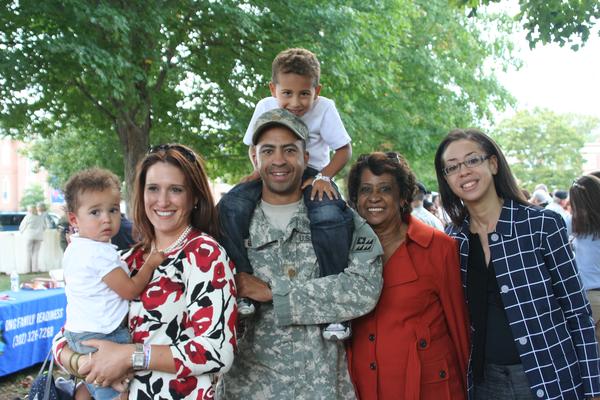Dover family dealing with Iraq vet’s sudden death
By Jeff Brown, News Editor
Courtesy of The Dover Post
27 October 2009
Major Franklin C. Blackmon Jr. of Dover, Delaware, and the rest of the Delaware National Guard’s 261st Signal Brigade spent close to a year training and working in Iraq. Despite the constant threat of attack, all returned safely to the First State at the end of September 2009.
It’s a mystery, then, why Blackmon, a healthy, vigorous father of two, suddenly succumbed to bacterial meningitis October 15, two weeks after the 261st was welcomed back during an emotional ceremony on Legislative Mall.
Blackmon, 35, died at Johns Hopkins Hospital in Baltimore, the day after being taken there for treatment.

“He was in good shape,” said Christine Blackmon, the soldier’s wife of 10 years. “He didn’t enjoy running, but he had a natural metabolism and good genes.”
“He’d go years between colds,” she added. “He was just a very healthy man.”
Bacterial meningitis is an infection of the protective membrane surrounding the brain and spinal column, according to information provided by the Centers for Disease Control. It can be rapidly progressive and it is not unusual for people to die within 48 to 72 hours of the onset of symptoms.
Although not as contagious as a cold or influenza, it can incubate for a long period of time.
But because the early symptoms mimic a cold or the flu, it can be difficult to catch the infection in its early stages.
That apparently is what happened to her husband, said Mrs. Blackmon.
“He’d been complaining of headaches and pain ever since he got back,” she said. “He just chalked it up to traveling, excitement and the change of environment.”
Saturday night, October 10, Blackmon went to the emergency room, but tests for swine flu — which he and other soldiers had been cautioned about when they underwent their physicals — came out negative. But over the weekend his condition worsened and he was admitted the evening of October 13 to the intensive care unit at Bayhealth-Kent General Hospital after vomiting and suffering seizures.
Blackmon was put under heavy sedation and Mrs. Blackmon was told tests on her husband had pinpointed meningitis as the cause of his problems.
His condition deteriorated over night, and the end came more rapidly than she could possibly have expected.
By 7:30 a.m. October 14, doctors determined her husband’s brain was no longer functioning, Mrs. Blackmon said. He was taken to Johns Hopkins Hospital in his hometown of Baltimore later that day, but there was no change.
Blackmon was declared dead at 7:32 p.m., October 15.
“We went from ‘Honey, I have a headache’ to seizures,” Mrs. Blackmon said. “I think he probably knew what was happening. But he was in a lot of pain and he could not communicate at that point.”
Funeral services for Blackmon were held October 23 in Baltimore, and he was buried October 27 in Arlington National Cemetery.
Lieutenant Colonel Len Gratteri, public affairs officer for the Delaware National Guard, said if any of the returning soldiers had a medical problem when they underwent their separation physicals, they would have been placed on medical hold. With no apparent problems uncovered at the screening, Blackmon was sent home.The Delaware National Guard is not conducting an investigation into the circumstances surrounding Blackmon’s death, Gratteri said.
According to the CDC, because of its symptoms, unless tests are conducted specifically for meningitis, it often can be overlooked during a routine physical.
Blackmon’s loss has been particularly felt at the state’s guard headquarters, where he served as a full time signal officer, said Major General Francis Vavala, Adjutant General and Commander of the Delaware National Guard.
“Any time we lose someone from the Delaware National Guard family, it hurts,” said Vavala. “This loss is particularly painful as Maj. Blackmon had been away in Iraq the past year.
“He was a valued leader, mentor and contributor to the organization and will be missed by all,” Vavala continued. “Our thoughts and prayers are with the entire Blackmon family and we will make available every resource we have to support his wife, children and extended family.”
As for Mrs. Blackmon and her children, Curtis, 5 and Sophia, who turns 2 in November, they are coping with their loss.
“I’ve got a lot of friends in the guard,” she said. “It’s an absolute family.
“There’s been a lot of grief; they made it home without so much as a hangnail and to have this happen comes as a real shock.”
Everyone has been as helpful as possible and has treated her with the greatest of respect, Mrs. Blackmon added.
And although the last few days have been difficult, Mrs. Blackmon said she has more than a decade of memories to fall back on.
“I had more love and more happiness in our 10-year marriage than others have in a lifetime,” she said. “There’s nothing about that man I don’t want to shout from the rooftops.”
Michael Robert Patterson was born in Arlington and is the son of a former officer of the US Army. So it was no wonder that sooner or later his interests drew him to American history and especially to American military history. Many of his articles can be found on renowned portals like the New York Times, Washingtonpost or Wikipedia.
Reviewed by: Michael Howard
